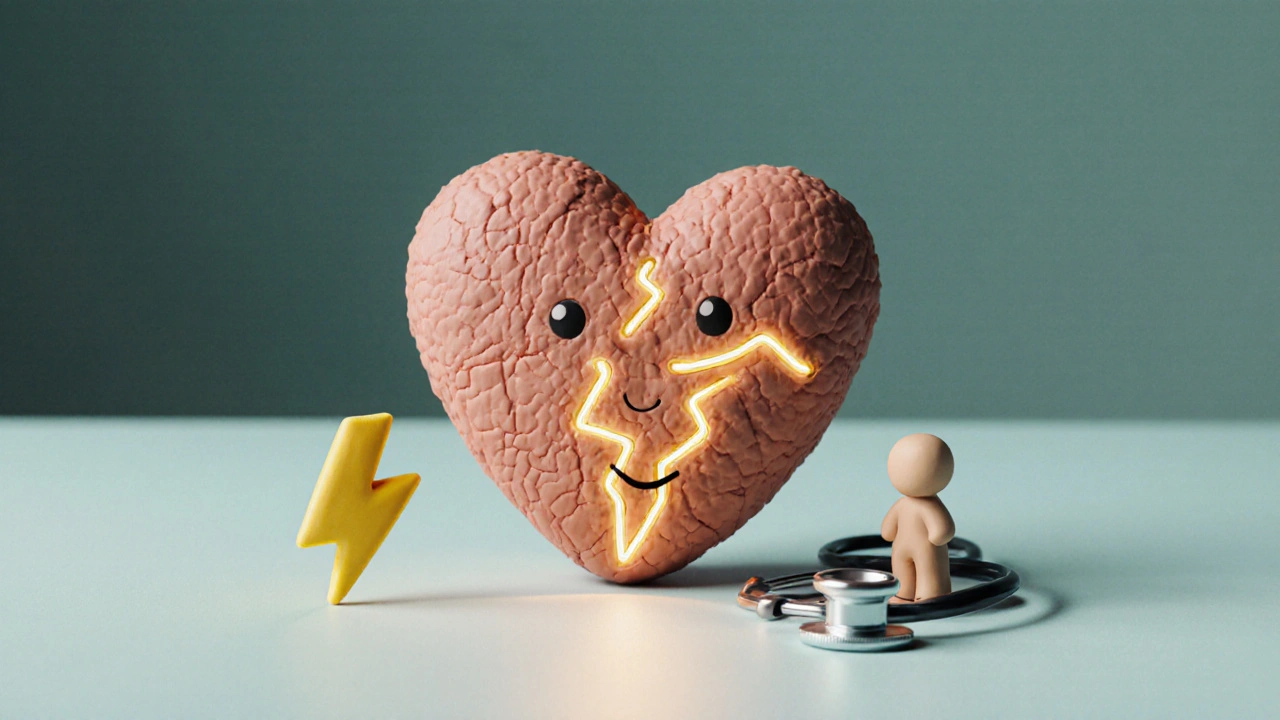Key Takeaways
- Maintain a balanced diet low in sodium and processed foods.
- Engage in regular aerobic exercise (150min/week minimum).
- Control blood pressure, weight, and blood sugar levels.
- Limit caffeine, alcohol, and quit smoking.
- Prioritize stress management and quality sleep.
When it comes to heart health, irregular heartbeat is a condition where the heart beats too fast, too slow, or in an uneven rhythm. It’s medically called arrhythmia and can lead to dizziness, fatigue, or more serious complications if ignored. Fortunately, most risk factors are within your control. Below is a step‑by‑step plan you can start today to lower your odds of developing an irregular heartbeat.
What Exactly Is an Irregular Heartbeat?
In simple terms, an irregular heartbeat means the electrical signals that tell the heart when to contract become disorganized. Atrial fibrillation, ventricular tachycardia, and premature beats are common sub‑types. While some episodes are harmless, persistent arrhythmias increase the risk of stroke and heart failure. Knowing the underlying drivers lets you intervene early.
Core Lifestyle Drivers
Research from the American Heart Association (2024) shows that five lifestyle pillars account for over 80% of arrhythmia risk:
- High blood pressure (Hypertension).
- Excess body weight (Obesity).
- Chronic stress (Stress).
- Poor sleep quality.
- Stimulant overuse (caffeine, alcohol, nicotine).
Addressing each pillar reduces the electrical turbulence that fuels arrhythmias.
Eat Right: Nutrition That Keeps Your Rhythm Steady
Diet plays a direct role in blood pressure, inflammation, and electrolyte balance-three key contributors to arrhythmias.
- Lower sodium. Aim for less than 1,500mg per day. Processed meats, canned soups, and fast‑food sauces are hidden sodium traps.
- Increase potassium‑rich foods (bananas, spinach, sweet potatoes). Potassium helps the heart’s electrical system reset after each beat.
- Choose healthy fats. Omega‑3 fatty acids from salmon, walnuts, and flaxseed have been shown to lower atrial fibrillation incidence by up to 15%.
- Limit refined carbs and sugary drinks. They spike insulin and can aggravate blood sugar swings, which in turn affect heart rhythm.
Adopt a Mediterranean‑style plate: half vegetables, a quarter lean protein, and a quarter whole grains, with olive oil as the primary fat source.

Move More: Exercise As an Anti‑Arrhythmia Tool
Regular aerobic activity strengthens the heart muscle, improves circulation, and keeps blood pressure in check.
Guidelines for 2025 recommend:
- At least 150minutes of moderate‑intensity cardio (brisk walking, cycling) per week, or 75minutes of vigorous activity (running, swimming).
- Two strength‑training sessions weekly to preserve muscle mass and boost metabolic health.
- Short, high‑intensity interval bursts (e.g., 30‑second sprints) if you’re pressed for time; studies show they improve cardiac autonomic balance.
Start small: a 10‑minute walk after dinner can turn into a 30‑minute stroll within a month.
Manage Stress and Sleep
Stress hormones (cortisol, adrenaline) increase heart rate and can trigger premature beats. Chronic stress also raises blood pressure. Here’s what works:
- Mindfulness meditation for 10minutes daily. A 2023 meta‑analysis linked meditation to a 12% reduction in atrial fibrillation episodes.
- Deep‑breathing exercises (4‑7‑8 technique) during high‑stress moments.
- Maintain a consistent sleep schedule: 7‑9hours per night, dark bedroom, and no screens an hour before bed.
When sleep quality dips below 85% efficiency (time asleep vs. time in bed), arrhythmia risk climbs noticeably. Track sleep with a wearable or a simple sleep diary.
Watch Substances: Caffeine, Alcohol, and Smoking
Stimulants can provoke ectopic beats-extra heartbeats that feel like a flutter.
- Caffeine: Limit to 200mg (about one 12‑oz coffee) per day. Sensitive individuals may need to cut out caffeine entirely.
- Alcohol: Keep to moderate levels-no more than one drink for women, two for men. Binge drinking raises atrial pressure and can spark atrial fibrillation.
- Smoking: Quitting is perhaps the single biggest move. Nicotine spikes heart rate and damages the lining of blood vessels, which accelerates arrhythmia risk.
If you need help quitting, talk to a healthcare provider about nicotine replacement or counseling programs.

Monitor Your Health: Check‑ups and Early Detection
Even with the best lifestyle, some people develop arrhythmias due to genetics or age‑related changes. Regular screening catches problems before they become dangerous.
- Annual physical with blood pressure, cholesterol, and glucose tests.
- Electrocardiogram (ECG) every 2‑3years after age40, or sooner if you have a family history.
- Wearable heart‑rate monitors can alert you to irregular patterns; look for devices approved by the FDA.
Ask your doctor about a Holter monitor (24‑hour ECG) if you notice palpitations, shortness of breath, or fatigue during activity.
Quick Checklist to Lower Arrhythmia Risk
- ☑️ Keep sodium <1,500mg/day.
- ☑️ Eat at least two servings of omega‑3 rich foods weekly.
- ☑️ Exercise 150min/week; add strength work.
- ☑️ Sleep 7‑9hours, same bedtime nightly.
- ☑️ Limit caffeine to 200mg and alcohol to moderate levels.
- ☑️ Quit smoking; seek professional help if needed.
- ☑️ Schedule an annual heart check‑up after age40.
Risk Factor vs. Action Table
| Risk Factor | Recommended Action |
|---|---|
| High Sodium Intake | Choose fresh produce, read labels, avoid processed foods. |
| Hypertension | Monitor BP daily, follow DASH diet, exercise regularly. |
| Obesity | Aim for 5‑10% weight loss through diet + activity. |
| Excess Caffeine | Limit to one small coffee per day; switch to herbal tea. |
| Alcohol Overuse | Stick to recommended limits; have alcohol‑free days. |
| Smoking | Enroll in cessation program; use nicotine‑replacement patches. |
| Chronic Stress | Practice mindfulness, schedule leisure, consider therapy. |
| Poor Sleep | Establish bedtime routine, keep room cool, avoid screens. |
Frequently Asked Questions
Can occasional palpitations be harmless?
Yes, brief episodes caused by stress, caffeine, or dehydration are usually benign. However, if they last more than a few seconds, recur frequently, or are accompanied by dizziness, you should seek medical evaluation.
How often should I get an ECG if I have a family history of arrhythmia?
A baseline ECG at age 35 is a good start. If results are normal, repeat every 3‑5years, or sooner if you notice symptoms.
Is there a safe amount of caffeine for heart‑healthy people?
Most studies point to a ceiling of 200mg per day (about one 12‑oz coffee). Sensitive individuals may need to stay below 100mg.
Do wearables really detect irregular heartbeats?
FDA‑cleared devices that use ECG or photoplethysmography can flag atrial fibrillation with high accuracy, but they are not a substitute for a professional diagnosis.
What dietary pattern is best for preventing arrhythmias?
The Mediterranean diet, rich in fruits, vegetables, whole grains, fish, and healthy fats, consistently shows the lowest incidence of atrial fibrillation in large cohort studies.

